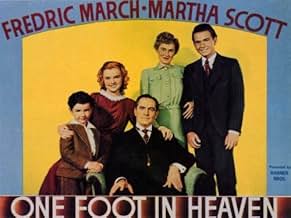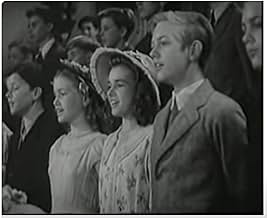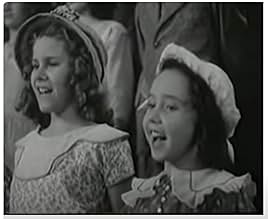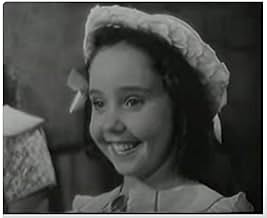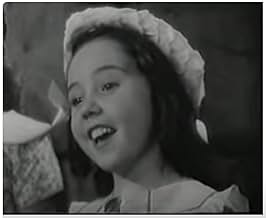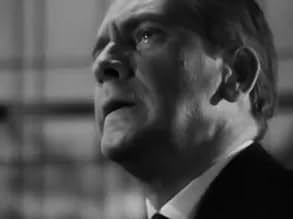IMDb RATING
6.6/10
1.6K
YOUR RATING
Episodic look at the life of a minister and his family as they move from one parish to another.Episodic look at the life of a minister and his family as they move from one parish to another.Episodic look at the life of a minister and his family as they move from one parish to another.
- Nominated for 1 Oscar
- 2 wins & 1 nomination total
Dorothy Adams
- Woman Behind Hope at Baptism
- (uncredited)
Joan Anderson
- Child
- (uncredited)
- Director
- Writers
- All cast & crew
- Production, box office & more at IMDbPro
Featured reviews
one foot in heaven is the type of movie that makes a person want to look into how their life has effected other people. (just as the movie about george baily in it's a wonderful life. a simple story about one man's life and how he was able to do, not exciting things, but long lasting things that made people better for having know him. it is great to find this movie playing on tv, but it should be put on dvd or tape for us to enjoy much more often.
ONE FOOT IN HEAVEN is a wonderful story of what it takes to not only endure the difficulties in being a minister; but how these problems build character.
Year after year of allowing church bosses and bullies to dictate what will and won't be allowed, the minister finally learns how to beat them at their own game.
It has so many touches of warmth, in which a subliminal message of truth is going on coupled with hints of blackmail and leverage.
When Dr. Spence refuses to name his own son Wm. Spence, Jr. because he says, "Junior is a sissy name and I won't have my son being a sissy!" his wife decides to coerce him by holding back on the cooking of dinner until he gives in to her wishes. Thinking she's won, he says he'll name the baby in church next Sunday. As he asks for the name and she announces to the congregation, "William Spence, Junior," he repeats it as "William Frasier Spence" ("named after my grand old Scottish Uncle Frasier--and I don't mean the one who was hanged as a horse thief!")
It is this war of wills that carries the story; making each episode build to the next one. Tempered with touches of right and wrong, it is a classic! A must see! Good conflict, good story line.
Nominated for an Academy Award for Best Picture.
Year after year of allowing church bosses and bullies to dictate what will and won't be allowed, the minister finally learns how to beat them at their own game.
It has so many touches of warmth, in which a subliminal message of truth is going on coupled with hints of blackmail and leverage.
When Dr. Spence refuses to name his own son Wm. Spence, Jr. because he says, "Junior is a sissy name and I won't have my son being a sissy!" his wife decides to coerce him by holding back on the cooking of dinner until he gives in to her wishes. Thinking she's won, he says he'll name the baby in church next Sunday. As he asks for the name and she announces to the congregation, "William Spence, Junior," he repeats it as "William Frasier Spence" ("named after my grand old Scottish Uncle Frasier--and I don't mean the one who was hanged as a horse thief!")
It is this war of wills that carries the story; making each episode build to the next one. Tempered with touches of right and wrong, it is a classic! A must see! Good conflict, good story line.
Nominated for an Academy Award for Best Picture.
In a class I was taking we were assigned to watch this movie, and then, on paper, keep track of the conflicts that were found. I couldn't stop writing. It was one conflict after another.
I have just been moved to a new church, and though my problems were no where near what the pastor in the movie had to face, I learned a lot from it and I decided to share it with others.
We showed the movie at a Sunday Night service and it was well received and I recommend showing it to your churches. It generated a lot of laughter, especially the differences from then to today, but it also made many good points that hit home. I noticed a change in their attitudes the next day.
I have just been moved to a new church, and though my problems were no where near what the pastor in the movie had to face, I learned a lot from it and I decided to share it with others.
We showed the movie at a Sunday Night service and it was well received and I recommend showing it to your churches. It generated a lot of laughter, especially the differences from then to today, but it also made many good points that hit home. I noticed a change in their attitudes the next day.
One Foot in Heaven is based on the memoirs of journalist Hartzell Spence's growing up as a Methodist preacher's kid in midwest USA from the Theodore Roosevelt era to the Roaring Twenties. It's what they mean when they talk about a family values film. The Camden Family of Seventh Heaven could well have been modeled on the Spence Family of generations past.
Young William Spence played by Fredric March has abandoned a career in medicine after being saved at a revival meeting and goes all the way and becomes a Methodist minister. Though taken aback by the career change, fiancé Martha Scott still marries him and the story follows them for the next 20 years or so, moving from one parish to another. Scott and March are such a good fit as the preacher and wife you would think that March was doing this with his own wife, Florence Eldridge.
March strikes just the right note as the minister, a just and pious man without being overbearing and sanctimonious. Would that preachers today were like him. He also demonstrates a capacity to learn. When his son goes to the silent cinema in defiance of Methodist preaching against the cinema, March takes him in hand to show him the error of his ways. They go to a William S. Hart western and March to his amazement finds he likes it and the western tale carries a good moral positive moral lesson. He changes his own view on the subject.
He also has to deal with a whole lot of modern day pharisees in dealing with the various politics of every parish he's assigned to. Chief among his tormentors are Beulah Bondi, the richest woman in town, who's actually offended by him treating her gardner Harry Davenport as an equal.
And there's Gene Lockhart who has something of the same role here as in Going My Way. But he's not as nice in this film. When he loses control of the church choir which Lockhart regarded as his private preserve, he and wife Laura Hope Crews mount a vicious smear campaign against March's son Frankie Thomas. His confrontation with Hope Crews and her gossip circle is a high point of the film.
Like Seventh Heaven there are some good humorous moments as well. I like March trolling for some marriage business down at the town clerk's office, looking for some wedding fees when times are a little lean. And the usual problems of dealing with parsonages which are not the most kept up buildings in the town.
The title of the film comes from March's explanation that he and his family have to set an example if in fact his profession puts them one foot in heaven already. It's good entertainment and Fredric March and Martha Scott do set the best example we'll ever see.
Young William Spence played by Fredric March has abandoned a career in medicine after being saved at a revival meeting and goes all the way and becomes a Methodist minister. Though taken aback by the career change, fiancé Martha Scott still marries him and the story follows them for the next 20 years or so, moving from one parish to another. Scott and March are such a good fit as the preacher and wife you would think that March was doing this with his own wife, Florence Eldridge.
March strikes just the right note as the minister, a just and pious man without being overbearing and sanctimonious. Would that preachers today were like him. He also demonstrates a capacity to learn. When his son goes to the silent cinema in defiance of Methodist preaching against the cinema, March takes him in hand to show him the error of his ways. They go to a William S. Hart western and March to his amazement finds he likes it and the western tale carries a good moral positive moral lesson. He changes his own view on the subject.
He also has to deal with a whole lot of modern day pharisees in dealing with the various politics of every parish he's assigned to. Chief among his tormentors are Beulah Bondi, the richest woman in town, who's actually offended by him treating her gardner Harry Davenport as an equal.
And there's Gene Lockhart who has something of the same role here as in Going My Way. But he's not as nice in this film. When he loses control of the church choir which Lockhart regarded as his private preserve, he and wife Laura Hope Crews mount a vicious smear campaign against March's son Frankie Thomas. His confrontation with Hope Crews and her gossip circle is a high point of the film.
Like Seventh Heaven there are some good humorous moments as well. I like March trolling for some marriage business down at the town clerk's office, looking for some wedding fees when times are a little lean. And the usual problems of dealing with parsonages which are not the most kept up buildings in the town.
The title of the film comes from March's explanation that he and his family have to set an example if in fact his profession puts them one foot in heaven already. It's good entertainment and Fredric March and Martha Scott do set the best example we'll ever see.
For those who are cynical about the religious life, here's a movie which ought to put some of that cynicism to rest. "One Foot in Heaven" is the true story of a Methodist preacher and his family, and it rings true, not just for the humanity Frederic March brings to his role as the preacher, but for the situations and characters that many of us, regardless of creed, will easily relate to. My dad used to say, A church is its people. I think One Foot in Heaven is a perfect illustration of this truth. Though this is a story about a preacher, we aren't preached at. There's a wonderful scene, with the preacher gently urging his agnostic doctor to start coming to church. He doesn't beat him over the head with a Bible but tries a more "humanist" approach.
Someone else has compared One Foot in Heaven with It's a Wonderful Life. Another film to compare is Going My Way. In fact, One Foot in Heaven and Going My Way were released just a year apart. There are story similarities, like the building of new churches (The Bishop's Wife is another example), but it's interesting to see how religion in the community is seen respectively through Protestant and Catholic lenses.
Then, there's the final scene. In some ways it's corny, but it still moves me. It hearkens to a time when religion wasn't sectarian but seamlessly interwoven in community life, unselfconsciously and unostentatiously. It was before the battle lines between religionists and secularists were drawn, when America had a "civil" religion. Alas, a time past.
Someone else has compared One Foot in Heaven with It's a Wonderful Life. Another film to compare is Going My Way. In fact, One Foot in Heaven and Going My Way were released just a year apart. There are story similarities, like the building of new churches (The Bishop's Wife is another example), but it's interesting to see how religion in the community is seen respectively through Protestant and Catholic lenses.
Then, there's the final scene. In some ways it's corny, but it still moves me. It hearkens to a time when religion wasn't sectarian but seamlessly interwoven in community life, unselfconsciously and unostentatiously. It was before the battle lines between religionists and secularists were drawn, when America had a "civil" religion. Alas, a time past.
Did you know
- TriviaWilliam S. Hart was the guest of honor at the Hollywood premiere of this movie, since his movie The Silent Man (1917) figures prominently in the plot.
- GoofsAt the beginning of the movie, William Spence (Fredric March) announces he has been "called" to the church and will become a pastor in the Methodist Church. His soon-to-be mother-in-law, Mrs. Norris (Nana Bryant)), replies that she would have preferred that he'd joined the Episcopal Church. At that time, in Canada, the dominant church was the Church of England, not the Episcopal Church. That is predominantly a US institution born out of the American Revolution.
- Quotes
William Spence: [to his son, Hartzell] A pastor's family are in a special category. We are uh... Well, It's as if we walked a sort of tightrope. Balancing with one foot on earth and one foot already in heaven.
- ConnectionsEdited into Happy Times and Jolly Moments (1943)
- SoundtracksThe Children's Prayer
(uncredited)
from "Hansel and Gretel"
Music by Engelbert Humperdinck
Libretto by Adelheid Wette
Sung by the Robert Mitchell Choir
Details
- Release date
- Country of origin
- Language
- Also known as
- Con un pie en el cielo
- Filming locations
- Production company
- See more company credits at IMDbPro
- Runtime
- 1h 48m(108 min)
- Color
- Aspect ratio
- 1.37 : 1
Contribute to this page
Suggest an edit or add missing content


